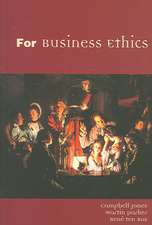Fighting Corruption Collectively: How Successful are Sector-Specific Coordinated Governance Initiatives in Curbing Corruption?: Wirtschaftsethik in der globalisierten Welt
Autor Berta van Schooren Limba Engleză Paperback – 12 mai 2017
Preț: 420.20 lei
Nou
Puncte Express: 630
Preț estimativ în valută:
80.43€ • 87.40$ • 67.61£
80.43€ • 87.40$ • 67.61£
Carte tipărită la comandă
Livrare economică 21 aprilie-05 mai
Preluare comenzi: 021 569.72.76
Specificații
ISBN-13: 9783658178376
ISBN-10: 365817837X
Pagini: 221
Ilustrații: XVII, 221 p. 20 illus.
Dimensiuni: 168 x 240 x 13 mm
Greutate: 0.39 kg
Ediția:1st ed. 2017
Editura: Springer Fachmedien Wiesbaden
Colecția Springer VS
Seria Wirtschaftsethik in der globalisierten Welt
Locul publicării:Wiesbaden, Germany
ISBN-10: 365817837X
Pagini: 221
Ilustrații: XVII, 221 p. 20 illus.
Dimensiuni: 168 x 240 x 13 mm
Greutate: 0.39 kg
Ediția:1st ed. 2017
Editura: Springer Fachmedien Wiesbaden
Colecția Springer VS
Seria Wirtschaftsethik in der globalisierten Welt
Locul publicării:Wiesbaden, Germany
Cuprins
1. Introduction.- 2. Theoretical Background: Self-interest as a Means of preventing Corruption.- 3. Methodological Approach.- 4. Multiple-Case Study Analysis.- 5. Cross-Case Analysis and Discussion.- 6. Summary and Conclusions.
Notă biografică
Berta van Schoor works as a compliance manager at a major German company. She wrote her doctoral thesis at the Business Ethics Chair of the Technical University Munich. As a co-leader of the regional chapter of Baden-Wuerttemberg of Transparency International Germany, she regularly speaks on topics like corruption prevention and the role of business in combating corruption. While working on her thesis she also gave lectures in business ethics and sustainability management.
Textul de pe ultima copertă
This book represents the first systematic qualitative analysis of a new type of collective anti-corruption initiatives. The author describes how companies can take responsibility in the fight against corruption and which six success factors play an important role in this difficult endeavor. Despite great international efforts throughout the last two decades, corruption has not significantly decreased on a global level. In light of globalization, private actors increasingly cooperate in the fight against corruption in the context of sector-specific coordinated governance initiatives. In this study, this new collective approach is examined in view of its potential to curb corruption.
Contents
• Introduction
• Theoretical Background: Self-Interest as a Means of Preventing Corruption
• Methodological Approach
• Multiple-Case Study Analysis
• Cross-Case Analysis and Discussion
• Summary and Conclusions
Target Groups
• Researchers and students in the fields of politics, economics, and business ethics
• Practitioners such as compliance managers and other anti-corruption specialists
The Author
Berta van Schoor works as a compliance manager at a major German company. She wrote her doctoral thesis at the Business Ethics Chair of the Technical University Munich. As a co-leader of the regional chapter of Baden-Wuerttemberg of Transparency International Germany, she regularly speaks on topics like corruption prevention and the role of business in combating corruption. While working on her thesis she also gave lectures in business ethics and sustainability management.
Caracteristici
First systematic qualitative analysis of collective anti-corruption initiatives Success factors of sector-specific anti-corruption initiatives How companies can take responsibility in the fight against corruption Includes supplementary material: sn.pub/extras Includes supplementary material: sn.pub/extras




















